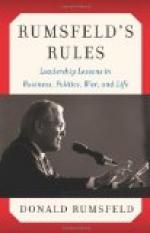November 8th, 1899
The war is doing us good. It is giving us the beginnings of political education in a department that has been utterly neglected. It may be worth while to review the whole situation of to-day, and to ask how the man in the street can lend a helping hand.
The British Government, primarily representing the people of Great Britain, has for many years been an affair of party; the dominant idea of the party leaders has been when out of office to get in, and when in to stay. The way to manage this was to cajole the man in the street, and as he was a busy man getting his living and not much concerned about watching the whole globe, the party leaders made bids for his support; votes to be distributed on the principle that one man was as good as another; taxation to be made light for him, and, consequently, as the money had to be found, heavy for some one else. Each party offered what it sincerely believed to be for the general good; but the kind of general good thought of was the personal improvement or comfort of each individual or of a mass of individuals. While this was going on in British towns and counties, something was happening on the neglected globe. There was a large part of the British Nation living on other continents without votes in any British town or county, yet looking to the British Government to champion something they loved, which has come to be called the Empire. There were also great nations emulating the British in the notion that the world was their inheritance, and that they would take possession of a fair share of it. Their quarrels had driven them to perfect their armies and to build navies. Each of them was annoyed to find that in the scramble for the heritage some one had been before them. On the best plots the British flag was flying, yet Great Britain had not much Army and was very careless about her Navy. The strong powers began to elbow her a little. The British Government was not disturbed by these hints from the globe. A Government made by a Parliament in which every member represented a town or a county or a scrap of a town or county, and in which no one represented the Nation, no one the Empire, and no one the Globe, felt bound to keep its eye upon towns and counties, the Opposition benches, and the next election. Why should it stand up for the British outside, and why concern itself about other Powers looking round the globe for claims to peg out? The colonists who looked to the British Government for championship were snubbed; the foreign Powers working for elbow-room were politely made way for, or if they brushed against the British coat-sleeve and caused an exclamation received a meek apology. This was the normal frame of mind of British party leaders and ministers, from which they have never quite emerged. They were asleep, dreaming of a parochial millennium.




